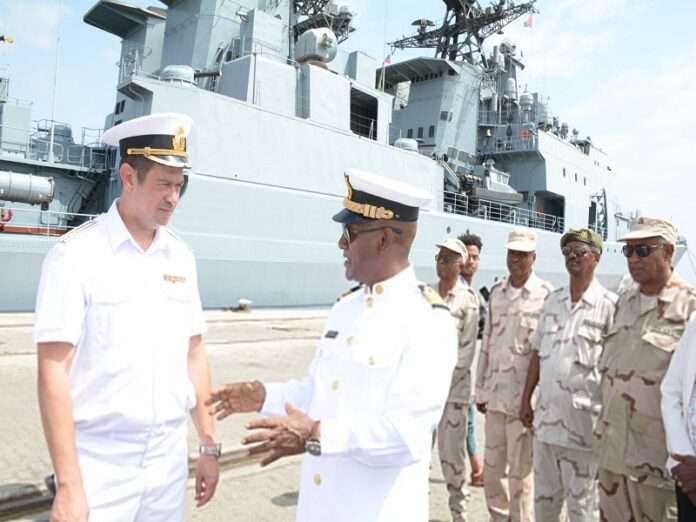A Russian warship just docked in Eritrea’s Massawa port ahead of joint naval drills for the first time since the latter obtained independence in 1993. Soviet warships had previously visited there back when Eritrea was just a province of Ethiopia, and the USSR reportedly had a secret base in the nearby Dahlak Archipelago, which is why this development sparked speculation about Russia’s plans. Some believe that it’s preparing to open up a naval base in Massawa, though it’s premature to reach that conclusion.
To be sure, bilateral relations are better than ever after President Isaias Afwerki’s two trips to Russia last year, which were respectively analyzed here and here. It’s upon this basis that the recent speculation has swirled, especially after it was revealed that Sudan reportedly sent arms to Ukraine last year and even hosted it special forces to fight against allegedly Wagner-backed rebels, which could ruin its naval base deal with Russia if true. Some then thought that Russia might actively look for a placement port.
It was argued here that Somaliland would be the best alternative though since that could enable Russia to strengthen its ties with Ethiopia and the UAE with a view towards creating a trilateral within BRICS. Those two are close with Somaliland and nowadays have difficult ties with Eritrea, which distanced itself from Ethiopia after November 2022’s Cessation Of Hostilities Agreement with the TPLF and accordingly became suspicious of Addis’ close partners in Abu Dhabi, especially after the start of this year.
Ethiopia and Somaliland signed a Memorandum of Understanding on 1 January that’ll give the first military-commercial port rights in the second in exchange for shares in at least one national company and formally recognizing its redeclaration of independence from 1991 once their talks are completed. Eritrea was enraged since it had hoped to become Ethiopia’s alternative route to the sea as Addis diversifies from its dependence on Djibouti, but it refused to allow its neighbor to open up a naval base.
This analysis here explains the strategic calculations that went into Ethiopia’s deal with Somaliland as well as the reason why the coastal countries reacted so negatively, namely because they envisaged containing Ethiopia by controlling its maritime access and depriving it of a navy so as to keep its supply chains dependent on them. From their zero-sum perspective, Ethiopia is an aspiring hegemon that’ll lord over them after breaking out of its containment, which they suspect the UAE had a hand in helping it do.
Even prior to then, however, Eritrea’s distrust of Ethiopia over the past year was already creating challenges for Russia’s balancing act as was explained here last November. Whereas Ethiopia isn’t paranoid about its partners’ ties with rivals like Eritrea, the opposite is true of Eritrea, which is obsessed with how others’ moves could potentially reshape the regional balance of power and influence. It’s within this context that the decision to let the Russian warship dock at Massawa should be interpreted.
While appearing on the surface to simply be a friendly gesture, and it no doubt was intended to be from the Russian side when they requested this, Eritrea arguably expects that its perception managers on social media can spin this in such a way as to falsely present Moscow as taking Asmara’s side over Addis’. “The Russian Ambassador Confirmed That Ties With Ethiopia Will Continue Strengthening” so there’s no truth to that innuendo, but it still shouldn’t be ruled out that Eritrea won’t try to promote it anyhow.
Eritrea is desperate for friends and funds after being largely isolated from the international community over the past three decades, which even saw it sanctioned by the UNSC from 2009–2018 for its ties with terrorist-designated Al-Shabaab, so it might make Russia an attractive deal to set up a base in Massawa. It would of course serve Russia’s interests to have a reliable alternative to Sudan in the event that their naval base deal falls flat, but the Kremlin would do well to thoroughly think this offer through.
Agreeing to open up an official naval facility there won’t harm its relations with Ethiopia or the UAE, which don’t view their partners’ ties with third parties through zero-sum perspectives, but it could facilitate Eritrea’s efforts to manipulate the region’s popular perceptions of its policy. The fact of the matter is that Ethiopian-Eritrean relations are so tense that many from the first might be deeply disappointed if their historical Russian partner decides to set up a base in the second at this time.
Eritrea’s perception managers could easily spin this as Russia supposedly taking their country’s side against Ethiopia such as by suggesting that Moscow might either directly intervene in its support if another war between those two breaks out or at least resupply it via its Massawa base. To be clear, Russia is neutral in their disputes, but the average Ethiopian might be unaware of this or so emotionally invested in the latest tensions that they misinterpret a naval deal with Eritrea as aimed against them.
The precedent of America’s and Turkiye’s recent deals with neighboring Somalia is telling. Both were agreed to in February shortly after Ethiopia’s Memorandum of Understanding with Somaliland. The first will build five bases for Somalia while the second will be in charge of its coastal security. Ethiopians were already suspicious enough of the US as it was even before that, but this view has since intensified. As for Turkiye, they still regard it as a close partner, but some now wonder whether it has ulterior motives.
Seeing as how Afwerki courted Eritrea’s former Italian colonizer during his trip to Rome earlier in the year that was touched upon in this analysis here, he’s therefore likely trying to court Russia right now as well, both outreaches of which are driven by the worsening security dilemma with Ethiopia. It’s ultimately Russia’s choice whether to accept his possible naval base offer, but its policymakers should ask themselves whether that facility is worth potentially losing the support of its oldest African ally’s people.






